On 6 September, 22 friends, family and colleagues – including her partner, Jon Richmond, and son, Charlie Graham – will take on the 1,085m ascent.
They aim to raise £4,000 for the Haematology Ward at Doncaster Royal Infirmary (DRI), where Karen chose to receive her end-of-life care.
Karen had spoken of climbing Snowdon herself but was unable to. As a tribute, her loved ones will complete the challenge in her honour.
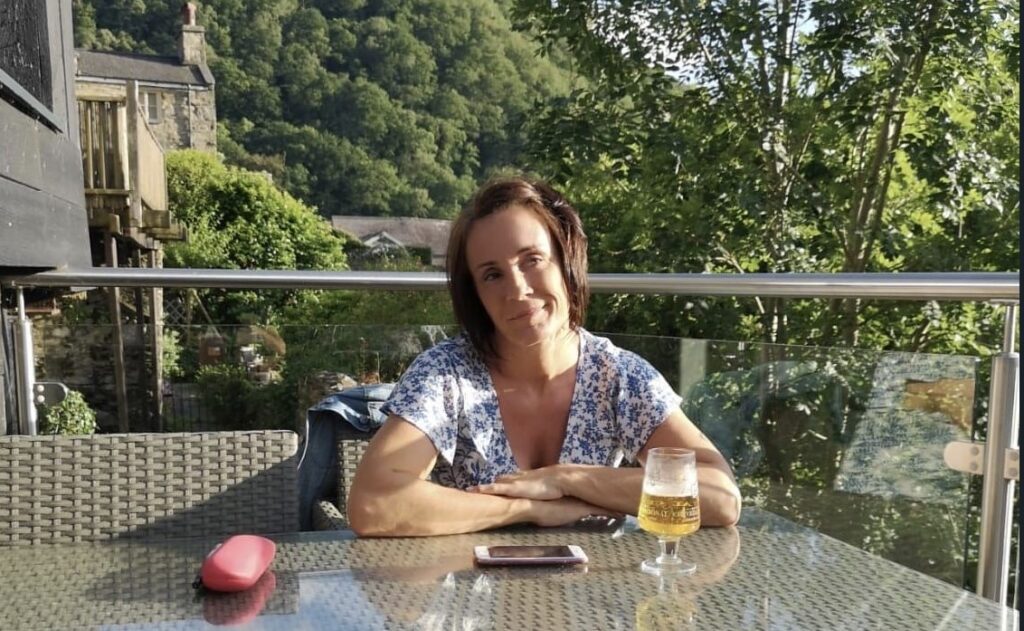
Jon, Karen’s partner of 18 years, said: “Karen was a very kind and generous person who was loved by many people.
“She had a very close-knit group of friends, and it’s no surprise to me that they’ve come together to do this in her memory.”
Affectionately known as ‘Kazza’, Karen dedicated 30 years to her role as a Maternity Support Worker at DRI, where she is remembered as a passionate and caring professional who ‘always gave 110%.’
Friend and Community Midwife, Zoe Greenall, said: “Her passion for her job was massive. She only ever saw the good in everyone.
“She worked many extra hours. Even on her final working day she was so happy to go that extra mile to support one of our ladies.”
Outside of work, Karen loved long walks with Jon and their eight-year-old beagle, Barney.
In May last year, Karen joined 23 colleagues to complete the gruelling 24-mile Yorkshire Three Peaks challenge, raising over £10,000 for blood cancer charity Anthony Nolan.
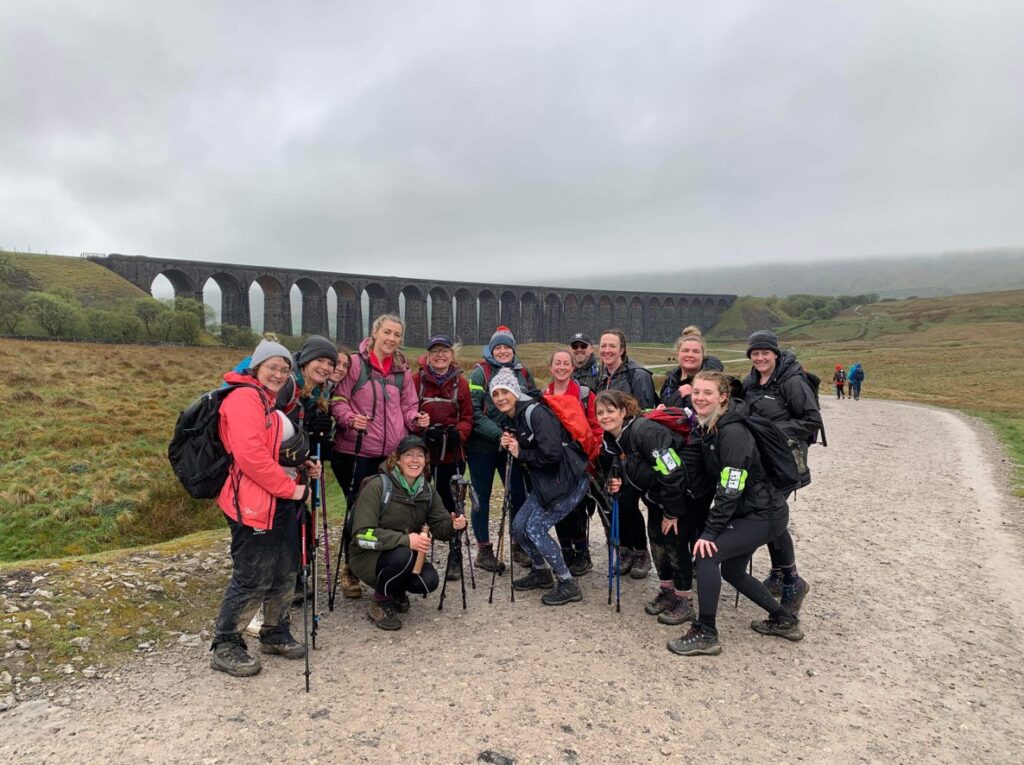
Zoe said: “Kazza was advised it wasn’t safe to hike to the peak but that wasn’t going to let that stop her.
“The courage and determination she showed was immense whilst still receiving treatment.”
Last summer, her 22-year-old son, Charlie, graduated from university, and Karen showed incredible strength to be there on his big day.
Zoe said: “Her pride and joy was her golden boy, Charlie. Kazza battled so hard through her treatment to ensure she was the proudest mum at his graduation.”
Now, the midwives will fulfil their promise to Karen and raise funds for the team who cared for her.

Zoe said: “We promised we would do this climb for her. In true Kazza style, she wasn’t going to let us get away with it and told all the staff we were completing it.
“The staff [on Ward 18] are all amazing. They go above and beyond not only for their patients but for the family and friends too, so Karen wanted to give something back.”
To support the community midwives fundraiser, visit: https://www.justgiving.com/page/zoe-greenall-4?utm_medium=FR&utm_source=CL&utm_campaign=015
About DBTH Charity:
Doncaster & Bassetlaw Teaching Hospitals’ Charity is the official charity which supports Doncaster and Bassetlaw Teaching Hospitals Trust to go above and beyond by providing additional equipment, services and amenities for our patients, visitors and staff which cannot be funded by the NHS alone.
These additional extras would not be possible without the support of our community. With your help, we can continue to work with our Trust to fund innovative and exciting projects that make a difference to our patients, their families and our colleagues who care for them.
Visit the charity website to find out more: https://dbthcharity.co.uk/
Content out of date? Information wrong or not clear enough? Report this page.
We will not accept abuse of any kind. This includes verbal or physical abuse, threatening behaviour, intimidation, racism, or discrimination towards colleagues, other patients, or visitors.
Any individual behaving in this way will be asked to leave immediately. Security teams will be called to remove those who refuse, and in serious cases we will involve the police. Where appropriate, we also reserve the right to refuse treatment.
We are proud to work with partners across our communities in support of anti-racism. Together, we are committed to tackling racism in all its forms, and to ensuring our hospitals remain safe, respectful and welcoming for everyone.
The NHS belongs to all of us, and we will not tolerate actions or language that undermine the safety, dignity, and wellbeing of others.
Thank you for helping us keep DBTH a place of care, respect and equality.

Content out of date? Information wrong or not clear enough? Report this page.
Midwives Lizzie Ivill and Lee Gigg have both been nominated for the Sheffield Hallam Outstanding Midwifery Awards (SHOMA), a celebration of the very best in midwifery education and mentorship.
These annual awards are entirely student-led, with nominations made by those currently undertaking their midwifery studies at SHU.
The nominations praise Lizzie and Lee’s outstanding professionalism, their ability to inspire and guide, and the positive impact they have had on the learning experience of those they mentor. Students described how their support has helped them to grow in confidence, gain essential skills, and feel truly welcomed into the profession.
This recognition also reflects the wider culture within DBTH’s maternity services – one built on supportive leadership, a commitment to learning, and a belief in nurturing the next generation of midwives.
Lois Mellor, Director of Midwifery at DBTH, said: “We are incredibly proud of Lizzie and Lee for this well-deserved recognition. The fact that these nominations have come directly from students speaks volumes about the compassion, dedication, and quality of support they provide.
“They are a credit to both our maternity services and the profession.”
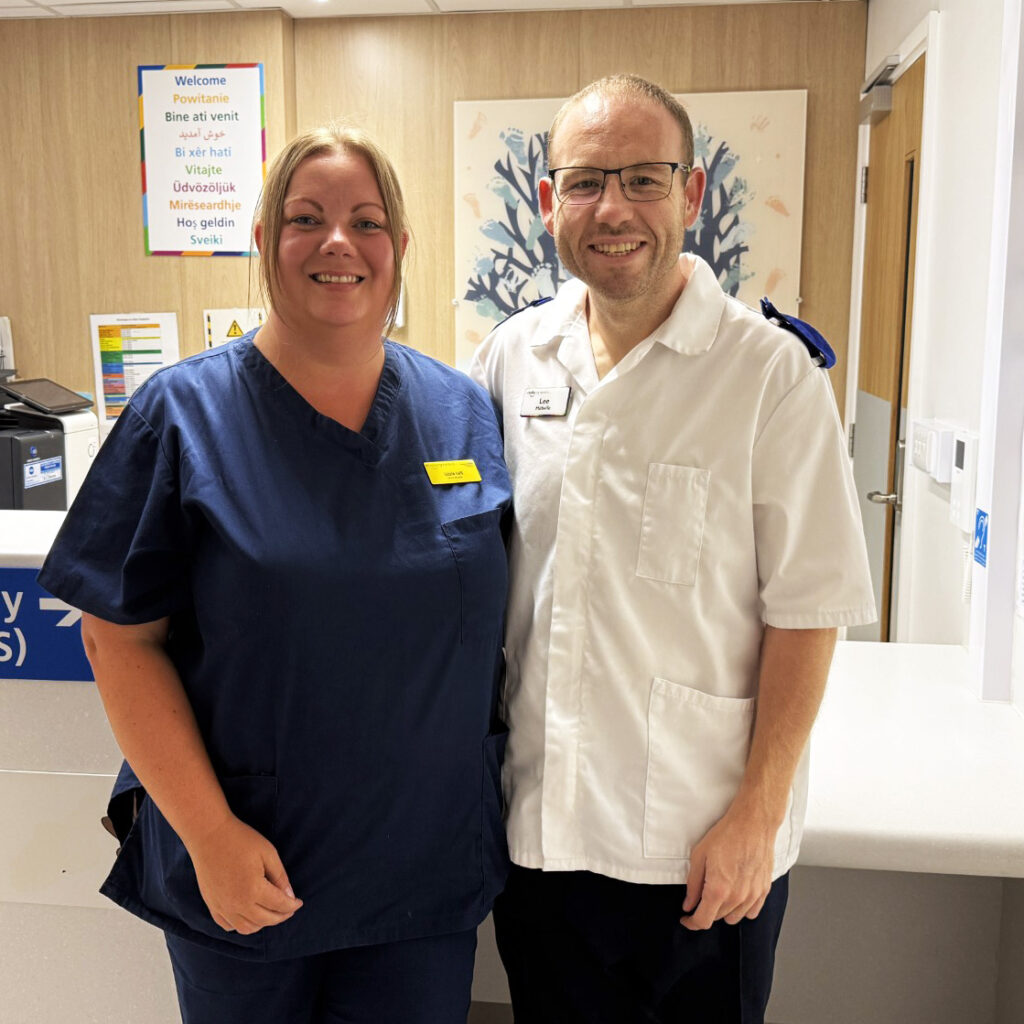
Professor Sam Debbage, Director of Education and Research at DBTH, said: “These nominations demonstrate the real-world impact our colleagues have on the future of healthcare.
“Lizzie and Lee are fantastic examples of how we are building a culture that supports learning, inspires professional growth, and helps us work towards our ambition of being recognised as a leading centre for education and research. We wish them the very best of luck at the ceremony.”
Lizzie and Lee will now join other nominees from across the region at the SHOMA ceremony on 28 August 2025, where the winners will be announced.
Content out of date? Information wrong or not clear enough? Report this page.
“It was only about 20 metres, but I knew in that moment something had to change,” Lee recalls.
“If I couldn’t manage that without being out of breath, I couldn’t carry on being the kind of midwife I wanted to be.”
After much thought, in September 2024 Lee made a life-changing decision to undertake gastric sleeve surgery. Since then, he has lost seven stone – and gained a new passion for running, fitness, and life itself.
By January this year, just four months after his operation, Lee tried his first run.
“It was tiny – one minute running, one minute walking. I remember thinking, ‘I’ll never be able to do this.’ But I kept going and eventually I managed my first 5km. It took an hour, but it was the start of something big for me.”
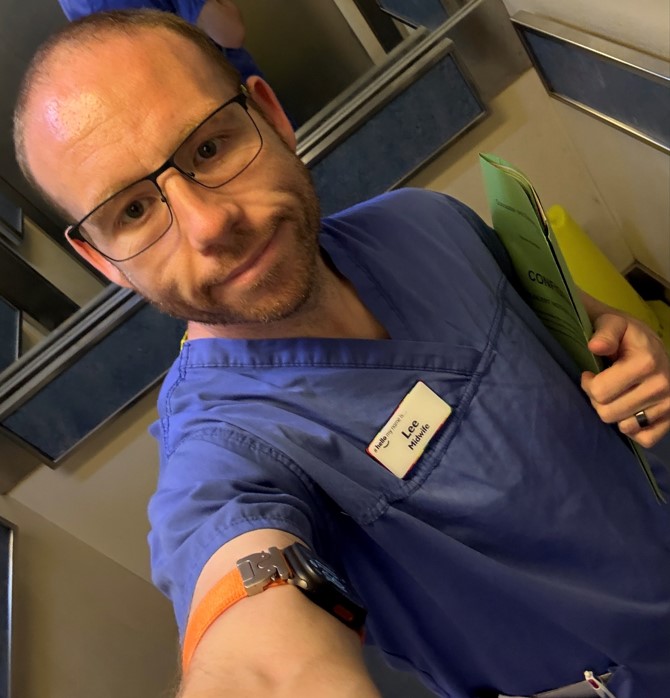
That “something big” is now a 200km running challenge throughout August, with Lee aiming to raise £1,500 for an ECG machine for the maternity unit at Doncaster Royal Infirmary, through Doncaster and Bassetlaw Teaching Hospitals Charity.
The new machine will allow the team to carry out vital heart checks for pregnant patients without borrowing equipment from other departments – speeding up care and reducing delays.
“This isn’t just about pushing myself physically,” Lee says. “It’s about giving back to the service that trained me and supports women and families through some of the most important moments of their lives.”
By mid-August, Lee had already clocked up around 80km – including a 22km run – despite battling summer heatwaves and fitting training around his shifts. “Sometimes I’ll get a lift to work and run home afterwards,” he explains. “It’s not always easy, especially in this heat, but I’m sticking to my weekly goals.”
Running isn’t the only new passion Lee has discovered. Losing weight has also given him the confidence to try something he’d always dreamed of: horse riding. “It’s something I never thought I’d be able to do. Now it’s become another hobby I really enjoy – it’s about making the most of my health and opportunities.”
And while the physical transformation has been dramatic, the mental benefits have been just as important. “I have far fewer down days now,” Lee says. “Running helps me clear my head after a tough shift, or wind down after a night shift. It’s not just exercise – it’s part of my wellbeing.”
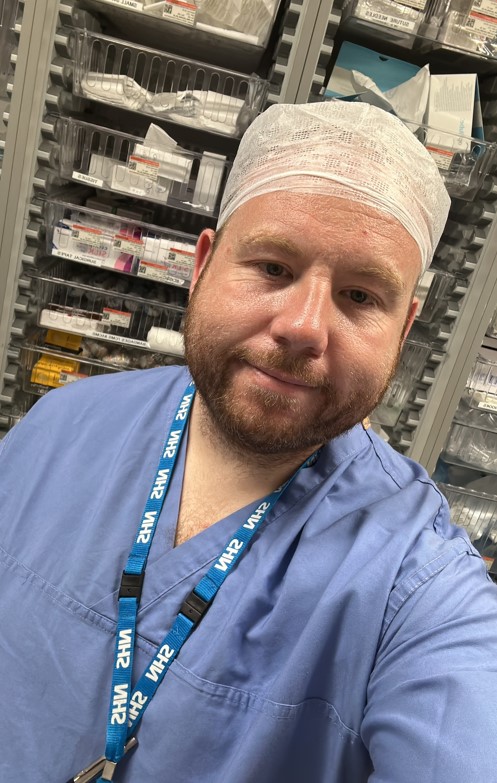
Suzy Brain England OBE, Chair of the Board at Doncaster and Bassetlaw Teaching Hospitals, said: “We’re so inspired by Lee’s story. This is an incredible personal challenge that will leave a lasting legacy for maternity patients.
“His determination and will power to take on such a massive feat is inspiring and we wish him all the best with his remaining miles.”
Lee’s final kilometres will be completed at the end of August – but his running journey, and the impact of his fundraiser, are set to continue well beyond that.
“This has changed my life,” he says simply. “Now I just want to make a difference for others, too.”
To support Lee’s challenge and help fund the ECG machine, search ‘Lee Gigg’ on Just Giving or visit: https://www.justgiving.com/page/midwife-lee?utm_medium=FR&utm_source=CL&utm_campaign=015
Content out of date? Information wrong or not clear enough? Report this page.
This bank holiday, local health services are here if you need them – but it’s important to know where to go. From pharmacies to NHS 111, urgent treatment centres to A&E, choosing the right option helps you get the care you need quickly while keeping our hospitals free for emergencies.
NHS 111:
There are a range of services available to help. Visit 111.nhs.uk or phone 111, 24 hours a day, 365 days a year for advice, appointments or to get directed to the most appropriate service.
Pharmacy
Local pharmacies can help with less urgent conditions and may be able to offer treatment and some prescription medicine without you needing to see a GP (this is called Pharmacy First).
Conditions they can treat through Pharmacy First are:
- Earache (aged 1 to 17 years)
- Impetigo (aged 1 year and over)
- Infected insect bites (aged 1 year and over)
- Shingles (aged 18 years and over)
- Sinusitis (aged 12 years and over)
- Sore throat (aged 5 years and over)
- Urinary tract infections or UTIs (women aged 16 to 64 years)
Some pharmacies open late (until midnight) and at weekends.
Self-care
Colleagues within NHS Nottingham and Nottinghamhire have also developed self-care information to help you manage common conditions such as minor burns and scalds, conjunctivitis, constipation and cystitis on our website: notts.icb.nhs.uk/your-health/stay-well/self-care/
Children’s health and wellbeing
Find advice for worried parents, covering common illnesses and when to seek treatment for you baby or child. This covers conditions such as chickenpox, asthma, earache, scarlet fever and many more. Visit: https://notts.icb.nhs.uk/your-services/childrens-health-and-wellbeing/
Mental health
If you need mental health support, or are in crisis, you can call 111 (option 2) to be directed to the right support. You can also find information on mental health services and support.
Nottinghamshire Crisis Sanctuaries can help you with support, information and guidance if you are over 18 years old and experiencing mental health issues or in a mental health crisis.
You can just drop in to one of the sanctuaries or visit https://www.nottinghamshirecrisissanctuaries.tv/ for more information.
- Beeston: 318 High Road, NG9 1EJ: 6pm to 11pm Monday to Sunday
- Mansfield: top of St John Street, NG18 1QJ: 4pm to 9pm Monday to Sunday
- Worksop: Hardy Street, S80 1EH: 5pm to 10pm Wednesday and Sunday
- Nottingham City: the Wellbeing Hub, 73 Hounds Gate, NG1 6BB: 6pm to 11pm Monday to Sunday
Details for support for mental health services in South Yorkshire can be viewed here: https://www.rdash.nhs.uk/services/adult-community-mental-health/
General practice
Contact your General Practice team about symptoms that aren’t going away. They can offer telephone, online, or face-to-face appointments with a GP, nurse or other healthcare professional depending on what your health concern is. Remember, your GP is open until 6.30pm and if you need help out of hours, please visit 111 online or phone 111.
Urgent treatment centres and minor injury units
For sprains, fractures, minor burns and skin infections:
- Doncaster Same Day Health Centre is open from 10am to 10pm at Cavendish Court, South Parade, DN1 2DJ. Available for appointments seven days a week, year round. Professional help from doctors, nurses and paramedics.
- Montagu Hospital – Minor Injuries Unit is open every day (except Christmas Day) from 9am to 9pm with the last admission at 8pm. Adwick Road, Mexborough, S64 0AZ.
- Nottingham – The NHS Urgent Treatment Centre (next to the BBC building) is open every day from 7am-7pm. Seaton House, London Road, Nottingham, NG2 4LA Tel: 0115 883 8500
- Newark – Newark Hospital is open every day 8am-10.30pm (last patient seen at 9.30pm). Boundary Road, NG24 4DE
Dental care
For urgent dental care you can call your local NHS dentist or contact NHS111.

Content out of date? Information wrong or not clear enough? Report this page.
Elm Valley Scooter Club, formed in the 1960s, was inspired after member Dean Howarth’s granddaughter, Maia, spent 68 days in the unit.
Born premature on 25 July 2024 at just 1lb 10 ounces, Maia’s weight dropped to 737 grams and she sadly contracted sepsis.
Maia’s mum, Elisha Walsh, said: “My hand was larger than she was and her skin was almost see-through.
“I watched her stop breathing on six separate occasions.”
After nearly 10 weeks on the unit, Maia was finally given the all-clear at a special ‘graduation ceremony’.
Elisha said: “The staff were great and supported us throughout everything.”

Now a healthy one-year-old, Maia is walking, talking and loves splashing in water. She ‘really is a mini marvel’, added Elisha.
The riders will set off from South Elmsall on 7 September, taking a scenic route to the Channel Tunnel and avoiding motorways due to their 50mph average speed.
They will travel through France into northern Spain, cruising down the east coast to Malaga, where members of the Costa del Sol scooter club ‘Los Motos Locos’ will join them for the final leg to Gibraltar.
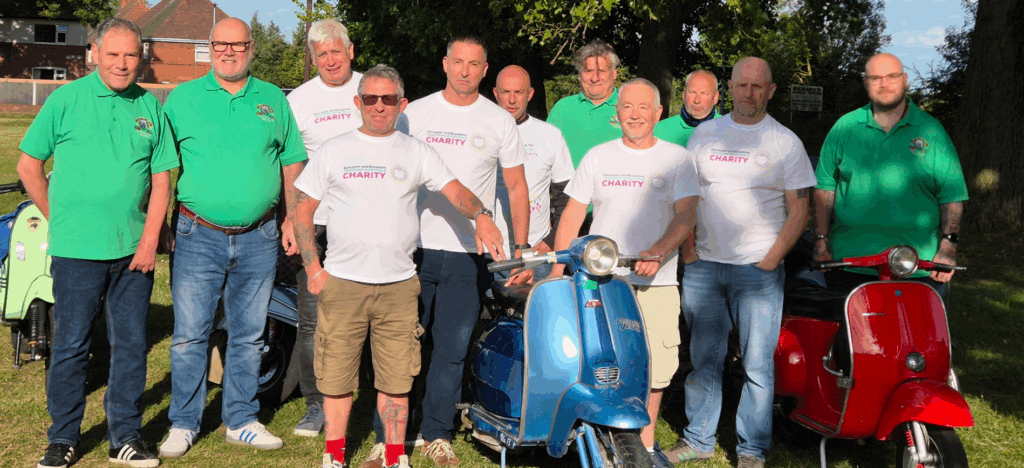
The trek finishes on 10 September, in time for Gibraltar Armed Forces Day and Gibraltar National Day.
With ex-fire and ex-military members in their ranks, the club will also donate to The Family Burns Club and Bosom Buddies Cancer Trust.
Organiser John Kitchin said: “All scooter clubs do a lot for charity, but we wanted to do something different. The three causes are close to individuals of the club.”
The scooter-enthusiasts have already raised over £5,000, with a goal of £7,500 to share between the charities.

Funds for the neonatal unit will support its ‘Mini Marvels’ appeal, improving the parents’ room, family room and milk kitchens.
Kayleigh Parker, Senior Sister Quality Lead for the Neonatal Unit, said: “We’re incredibly touched by the generosity and determination of the Elm Valley Scooter Club.

“Their 1,700-mile journey across Europe is not just a physical challenge but a powerful gesture of support for our babies and families. Their fundraising will help us create a more comforting environment for parents during what can be an overwhelming time.
“On behalf of the entire team, thank you for helping us make a real difference.”
The club would like to thank Maggie’s Chippy, and other businesses in South Elmsall, who have contributed to their incredible fundraising total so far.
To contribute to the Elm Valley Scooter Club fundraiser, visit: https://www.gofundme.com/f/ride-to-the-rock
About DBTH Charity:
Doncaster & Bassetlaw Teaching Hospitals’ Charity is the official charity which supports Doncaster and Bassetlaw Teaching Hospitals Trust to go above and beyond by providing additional equipment, services and amenities for our patients, visitors and staff which cannot be funded by the NHS alone.
These additional extras would not be possible without the support of our community. With your help, we can continue to work with our Trust to fund innovative and exciting projects that make a difference to our patients, their families and our colleagues who care for them.
Visit the charity website to find out more: https://dbthcharity.co.uk/
Content out of date? Information wrong or not clear enough? Report this page.
Senior colleagues joined construction specialists to formally break ground on the new building, with a target completion date for Autumn 2026.
Situated near the South Block entrance, the facility will provide a modern and high specification 22-bed department, designed to care for some of the hospital’s most critically unwell patients.
Equipped with advanced technology such as ventilators and continuous monitoring systems, and staffed by highly trained specialists, the Department of Critical Care provides specialist treatment for the hospital’s most vulnerable patients. This includes those who have experienced major trauma, serious illnesses such as sepsis or pneumonia, or who require close monitoring following complex surgery.
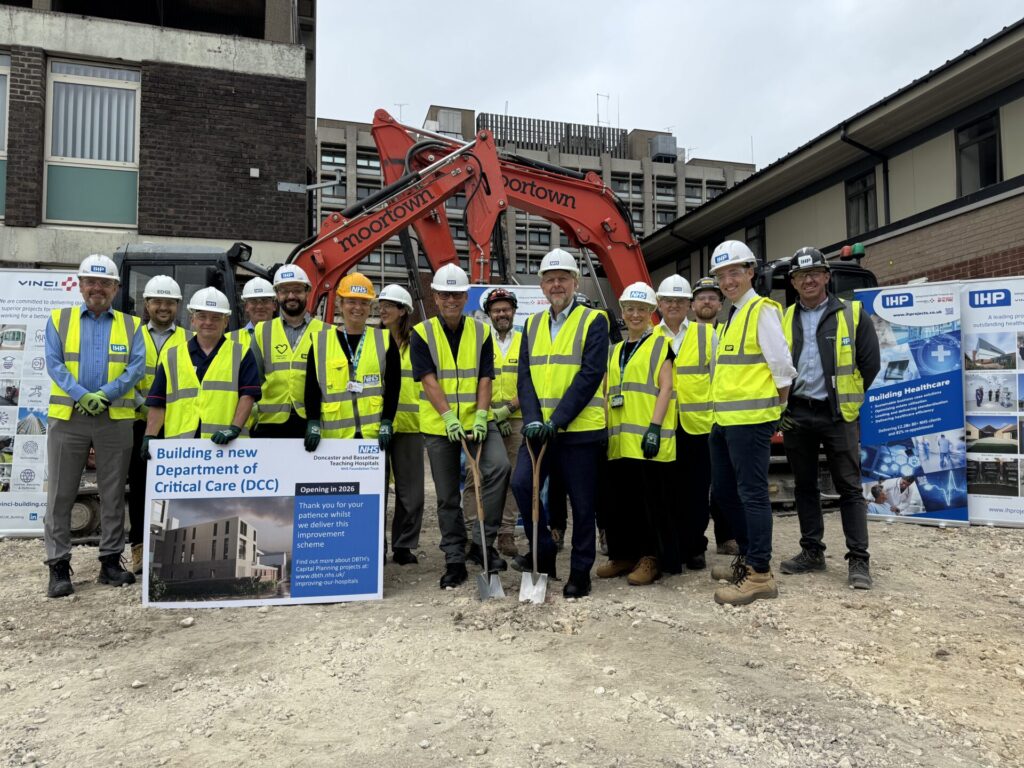
This development marks the latest step in a wider programme of estate improvements at the DRI site. Earlier this summer, a new Discharge Lounge opened at the front of the hospital, providing modern facilities and direct access to patient pick-up areas. In August, a new Surgical Same Day Emergency Care (SDEC) unit was also completed, giving patients quicker and easier access to assessment and treatment. Together, these relocations have freed up space for the construction of the new Critical Care Department.
Richard Parker OBE, Chief Executive at DBTH and Chair of the South Yorkshire and Bassetlaw Critical Care Network, said: “This new facility reflects one of the Trust’s strategic ambitions which is to improve our care environments.
“The new Department of Critical Care will provide a state-of-the-art unit to treat our most vulnerable patients to ensure we meet the demands of both today and future generations.”

Dr Kirsty Edmondson-Jones, Director of Infrastructure at DBTH, said: “We are looking forward to seeing this exciting development come to life, helping colleagues support high quality care for our most critical patients and making wider improvements to areas within the Doncaster Royal Infirmary site.”
Alongside the new department, the Trust is also working with colleagues in Palliative Care, Vinci Building and DBTH Charity to create a dedicated garden space. This will provide a calm and peaceful environment for patients nearing the end of life and their loved ones, complementing the wider redevelopment project.
For more information about the new Department of Critical Care, the palliative garden, or other ongoing developments at DBTH, please visit: www.dbth.nhs.uk.

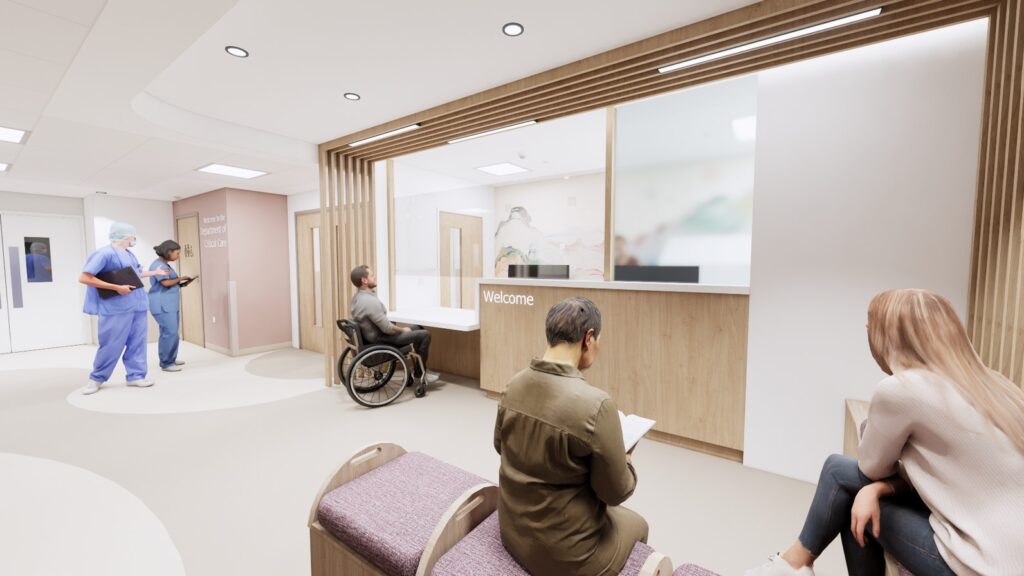
Content out of date? Information wrong or not clear enough? Report this page.
The Annual Members Meeting is an opportunity for patients, members of the public, colleagues and stakeholders to learn more about the Trust’s work, performance, and priorities.
It includes a formal presentation of DBTH’s Annual Report and Accounts for 2024/25, alongside an open and transparent discussion about the organisation’s achievements, challenges and plans for the future.
Ahead of the formal meeting, attendees can explore a special exhibition showcasing the work of services and teams across the Trust. This informal session offers a chance to speak with colleagues and learn more about how local NHS services are delivered.
Encouraging local people to attend, Suzy Brain England OBE, Chair of the Board at DBTH, said: “This meeting is a valuable opportunity for us to connect with our communities, share what we’ve achieved, and be honest about the challenges we face. Whether you’re a long-standing Member or simply interested in how your local NHS is run, I encourage you to come along, ask questions, and hear directly from the teams delivering care every day.”
The event is free to attend and open to all. For planning purposes, attendees are asked to register in advance.
To sign up, visit: https://tinyurl.com/DBTHAMMBook. Access requirements can be noted during registration.
Doncaster and Bassetlaw Teaching Hospitals is one of the region’s largest providers of hospital care, serving a population of more than 440,000 across Doncaster, Worksop and surrounding areas. The Trust runs Doncaster Royal Infirmary, Bassetlaw Hospital and Montagu Hospital, with over 7,000 colleagues working across its sites.

Content out of date? Information wrong or not clear enough? Report this page.
The Emergency Departments at Doncaster Royal Infirmary and Bassetlaw Hospital will remain open 24 hours a day for life-threatening conditions such as chest pain, severe bleeding or suspected stroke. However, for less urgent health concerns, people are asked to consider alternative options.
These include NHS 111, which is available online or by phone for advice and direction to the most appropriate care. Many local pharmacies will also be open with reduced hours and can help with minor ailments such as coughs, colds or rashes. For sprains, cuts, grazes and minor burns, Montagu Hospital’s Minor Injuries Unit in Mexborough is open every day from 9am to 9pm, with last admission at 8pm.
Dr Nick Mallaband, Acting Executive Medical Director at DBTH, said: “Bank Holidays can be especially busy for the NHS. If you take time now to check you’ve got enough of your regular medications, know which local services are open, and understand where to go if you need help, you’ll be doing your bit to help keep emergency care free for those with urgent and life-threatening issues.
“Planning ahead also gives you the best chance of enjoying a safe, comfortable and relaxing long weekend.”
Residents are also reminded to check they have enough of any regular medications and to stock up on household health basics such as paracetamol and plasters. It’s a good idea to familiarise yourself with local healthcare options, and check in on any vulnerable neighbours, friends or relatives who may need support.
Some outpatient clinics and non-urgent services may be closed over the bank holiday. If you have a scheduled appointment, please attend as normal unless you have been contacted to say otherwise.
For more information about local services and how to stay well this bank holiday, visit: www.dbth.nhs.uk
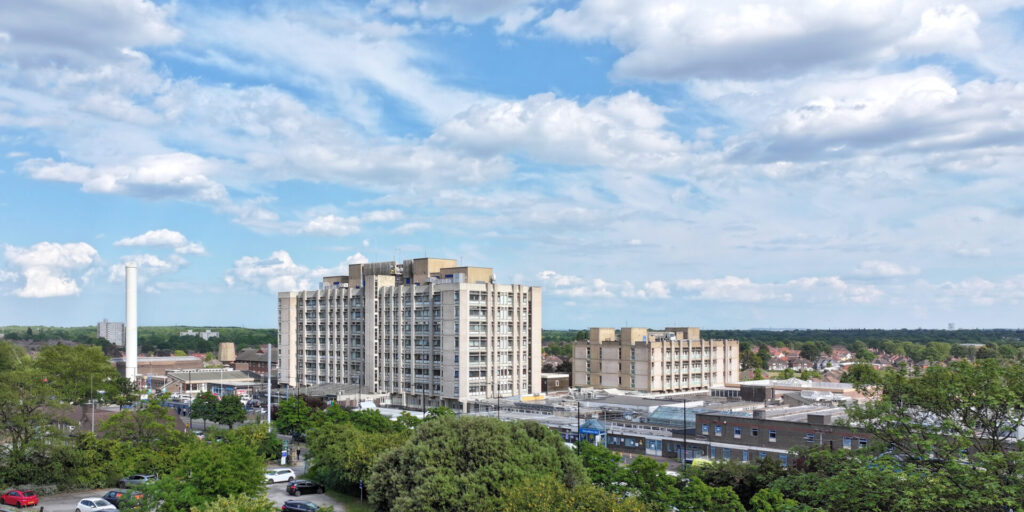
Content out of date? Information wrong or not clear enough? Report this page.
The unit is designed for patients who need urgent surgical assessment, tests, or treatment but are likely to be well enough to go home the same day.
Now located on Level 2 (ground floor), just a short walk from the site’s main entrance and the Outpatient 1 and 2 entrances, the unit is easier to access for patients and visitors.
The relocation is part of a £19.8 million regeneration programme designed to modernise and future-proof DRI’s estate. The bright and contemporary space offers 12 waiting room chairs for referred patients and creates a welcoming environment for both patients and colleagues.
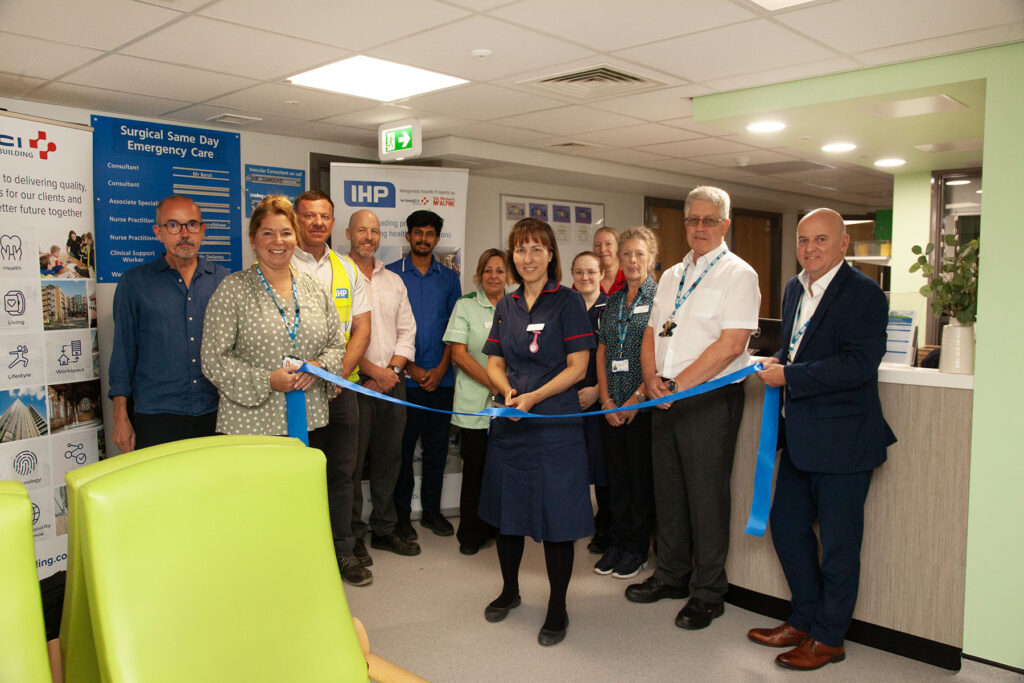
Importantly, this move unlocks further estate improvements across the site by freeing up space in the unit’s previous location for the planned construction of a new Department of Critical Care. It follows other recent upgrades, including the opening of the refurbished Discharge Lounge in July 2025.
Dr Kirsty Edmondson Jones, Director of Infrastructure at DBTH, said: “As part of our Strategic Ambition to provide the best care environments, relocating the Surgical SDEC is a significant step in modernising our facilities and addressing the needs of our ageing infrastructure.
“By investing in accessible, and modern spaces, we are not only improving the experience for patients and colleagues today but also creating the foundations for major developments in the future.”
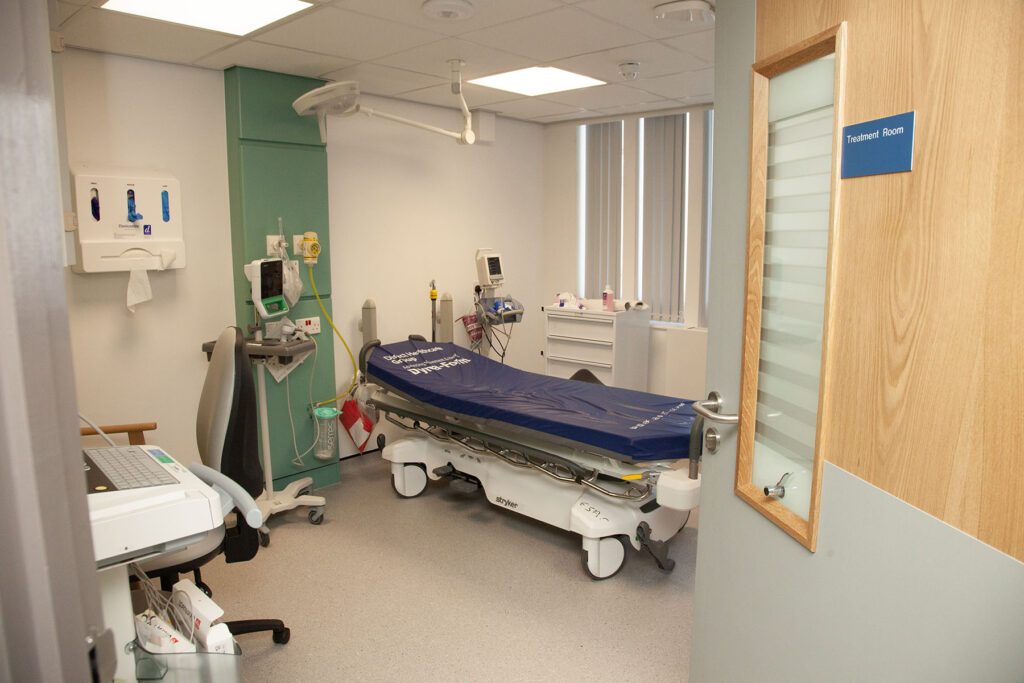
Deanna Cowlishaw, Lead Advanced Clinical Practitioner for the Surgical SDEC, said: “The new unit is easy to find and offers a refurbished and comfortable setting for patients. It’s a positive change for the team and the people we care for, and we’re looking forward to further settling into our new home.”
The refurbished facility will now serve as the permanent base for Surgical SDEC at DRI. To mark its opening, colleagues from the service joined members of the Capital Planning Unit, including Dr Kirsty Edmondson-Jones, and construction partners for a ribbon-cutting ceremony before welcoming the first patients.
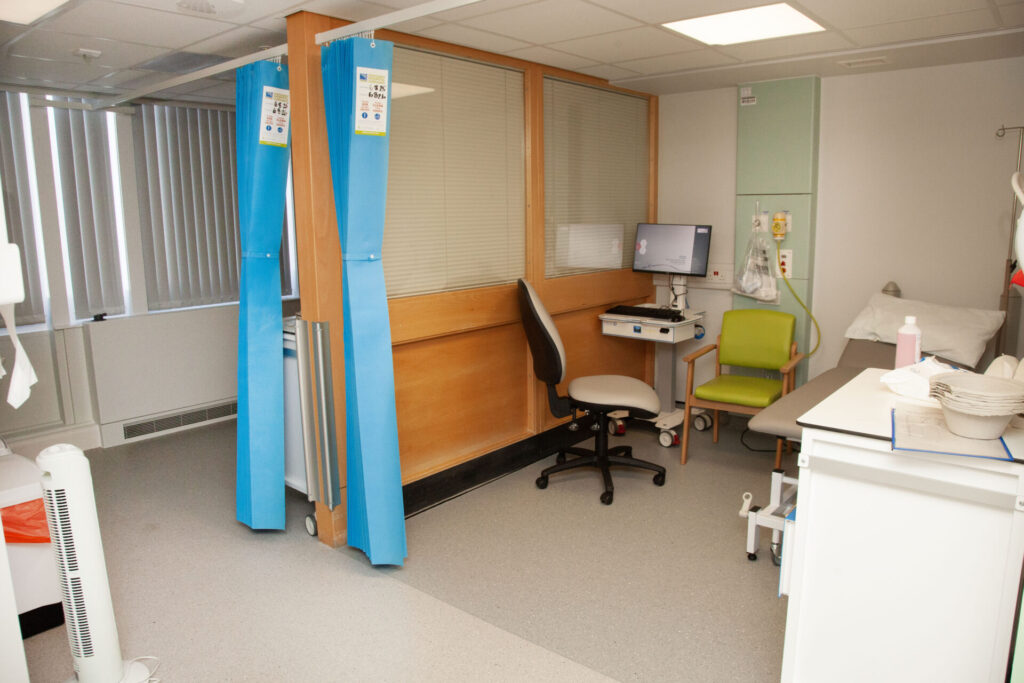
How to find the new Surgical SDEC at DRI:
- From Gate 4: Enter via the main entrance in the East Ward Block. Walk through the foyer towards the lifts, then turn right and follow the corridor. The department is on the left-hand side, halfway along the corridor.
- From Gate 3: Enter via the Outpatient 1 and 2 entrance. Go through the double doors in the far left corner, then take the corridor to the left. The department is on the right-hand side, halfway along the corridor.
For more information on how DBTH is improving its hospital environments, visit: www.dbth.nhs.uk/improving-our-hospitals
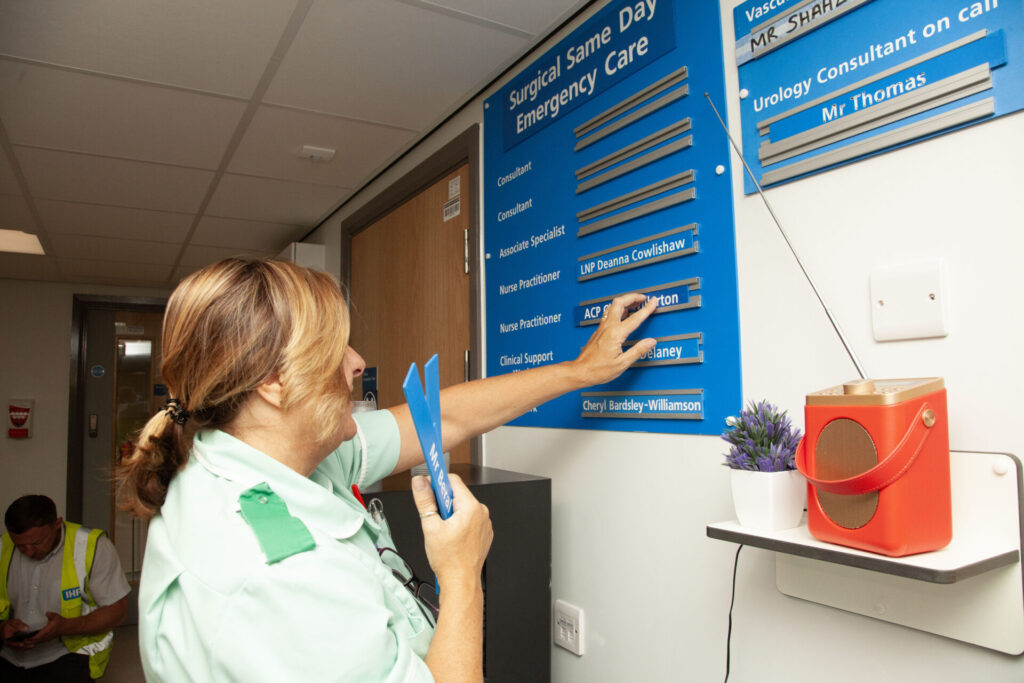
Content out of date? Information wrong or not clear enough? Report this page.
